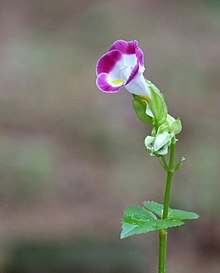The superasterids are members of a large clade (monophyletic group) of flowering plants, containing more than 122,000 species.[citation needed]
| Superasterids Temporal range:
| |
|---|---|

| |
| Torenia fournieri | |
| Scientific classification | |
| Kingdom: | Plantae |
| Clade: | Tracheophytes |
| Clade: | Angiosperms |
| Clade: | Eudicots |
| Clade: | Core eudicots |
| Clade: | Superasterids |
| Clades[1] | |
The clade is divided into 20 orders as defined in APG IV system. These orders, in turn, together comprise about 146 families.[1]
The name is based upon the name "Asteridae", which had usually been understood to be a subclass.
Relationships edit
The asterids, Berberidopsidales, Santalales, and Caryophyllales form the superasterids clade.[2] This is one of three groups that compose the Pentapetalae (core eudicots minus Gunnerales),[3] the others being Dilleniales and the superrosids (Saxifragales and rosids).[2]
Phylogeny edit
The phylogeny of superasterids shown below is adapted from the Angiosperm Phylogeny Group website.[2]
References edit
- ^ a b Angiosperm Phylogeny Group (2016). "An update of the Angiosperm Phylogeny Group classification for the orders and families of flowering plants: APG IV". Botanical Journal of the Linnean Society. 181 (1): 1–20. doi:10.1111/boj.12385.
- ^ a b c Peter F. Stevens (2001), Angiosperm Phylogeny Website
- ^ Philip D. Cantino; James A. Doyle; Sean W. Graham; Walter S. Judd; Richard G. Olmstead; Douglas E. Soltis; Pamela S. Soltis & Michael J. Donoghue (2007), "Towards a phylogenetic nomenclature of Tracheophyta" (PDF), Taxon, 56 (3): 822–846, doi:10.2307/25065865, JSTOR 25065865
External links edit
- Media related to Superasterids at Wikimedia Commons